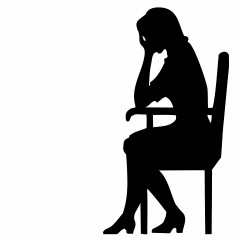Long before computers and office environments, when we lived with the monkeys and ran with the hares, stress was a necessary response to situations where we might find ourselves as dinner for some stronger, hungry dinosaurs. Stress is a fight or flight response and evolved to warn us about situations that might prove dangerous to our body integrity. It was no use reacting to a situation when a lion had half our hand – stress was the recognition that “this could get bad” and so we hightailed it outta there.
Stress releases a complex mix of hormones and chemicals which prepares us to fight or run away. It boosts our bodies ability to perform for a temporary period of time such as directing blood and energy to our muscles and shutting down body functions that are irrelevant to staying alive for the next few moments – digestion being the main one.

Which is all fine until stress becomes a continuous process. Modern life means 24/7 on – we are expected to be available for a vast chunk of the day, there is no ‘after work’ or time off. The boss is always just a phonecall, text or message away. You are expected to have it all – the latest phone, tablet, TV, car and good house. That means a great job but don’t foget the kids because if your facebook isn’t filled with images of happy families, you are wayyyyyyy behind everybody else. There is massive pressure to conform to an ideal and to ‘have it all.’
This ‘want’ – the need to have more and more and more can never be fulfilled because there is always more to want! So we end up on a mental treadmill, never really getting anywhere but filling our lives with more and more, yet never feeling at ease with ourselves.
Stress can be described as the response we have when we are not where we expect ourselves to be. In times past, this meant a place of safety rather than a place of danger. Today, it means stress can be caused by not meeting our own expectations or even not meeting the expectations of others.
Stress that is always on impairs our ability to function and heal. When we are stressed, we are not healing – because our bodies are in a flight or fight mode. Bodies that are stressed will deal with a critical injury but often fail to fight and treat illnesses that are not immediately life threatening. This gives the illness a chance to take root and before we are aware something is wrong, it can be too late.
The end result of stress is a weaker immune system over a prolonged period of time that allows illness to gain an upper hand in our bodies. Cue a massive response with drugs and therapies in order to get well again.
 Lots of people use medication to control our stress response – pills that calm us down, make us more focused, help us sleep or digest our food better. But none of these actually deal with the root cause of the problem – the stress event itself.
Lots of people use medication to control our stress response – pills that calm us down, make us more focused, help us sleep or digest our food better. But none of these actually deal with the root cause of the problem – the stress event itself.
Dealing with the stressful event is the only way to solve stress. We can think of stress as caused by our inner selves knowing there is a better way. If you find yourself stressed over prolonged periods, it’s time to examine whether your life matches what you want.
It’s different for everyone. One person will thrive in an environment of stock trading, the next will abhor its excesses. One will gladly spend all day minding the kid, the next needs to work instead. Another will find social settings or work life an immense challenge. There is no right or wrong, only that each of us must find a path that suits us.
If our stress is caused by anxiety about what others think or to have it all, then the answer is never outside of us – we cannot live our lives chasing the same things other people have. They are not us and we are not them and we should remember that they too are on a journey in life with their own life lessons to learn.
It is crucial that if we are to live healthy lives, stress is the exception rather than the norm. We need to understand that stress is caused when our way of living does not correspond with how we think we should be living.
Finding what makes us happy – whether in our work, social, emotional or spiritual spheres is the key to resolving a continuous state of stress. Lots of self help programs have at their core the method of goal setting and seeing where we want to be in one month or one year or five years and then setting goals to achieve those aims. They do this because it makes us think about what we really want out of life instead of just going through the motions and allowing the world to set our path. When we set goals, when we make a decision to change and to pursue what makes us happy, we begin to reduce stress and anxiety.
Instead of wasting our energies trying to project an image of ourselves that is not truly us, we should try to ‘just be’. Whatever we need is already inside of us. There is nothing ‘out there’ that will make us happy. There is no point in trying to mould ourselves to fit the ‘system’ or a way of life that is not us. When we realise this and begin to alter our path in life to one that is set by us, there is a huge sense of relief and well being. We then live in an environment which gives our body a chance to put away the stress response and relax, rest and heal itself.


